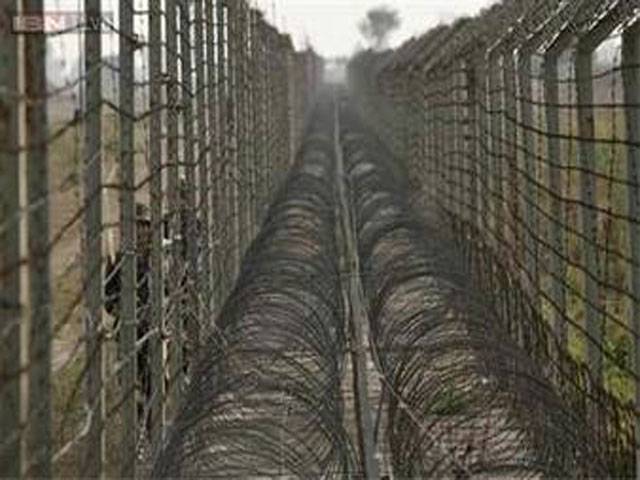ISLAMABAD - Pakistan approached India through diplomatic channel last week to indicate dates for a meeting between top military officials of the two countries to discuss measures to maintain ceasefire on the Line of Control (LoC) as agreed at the September 29 meeting between Prime Minister Nawaz Sharif and his Indian counterpart Manmohan Singh.
The leaders who met in New York on the sidelines of the UN General Assembly agreed to take immediate steps to stabilise the volatile situation along the LoC and restore ceasefire. It was, therefore, decided at the meeting to task the director general military operations (DGMOs) of both the countries to discuss measures to ensure ceasefire on the LoC.
A written communication in this regard was made by the Ministry of Foreign Affairs to the Indian Ministry of External Affairs within four days of the PM’s return from the US trip, it is learnt.
While both the sides are in touch over the matter, a formal response from New Delhi is still awaited. Indications are that the first meeting of the DGMOs would take place in New Delhi to be followed by another in Islamabad.
On the current standoff along the LoC, Indian External Affairs Minister Salman Khurshid was quoted Wednesday as saying: “We have asked the DGMOs to meet as often as possible to eliminate causes of friction in the past as well as to ensure that these things don’t keep getting repeated.”
The main objective of the DGMOs’ meeting would be to use the existing LoC mechanism more effectively, establish a joint mechanism for probing incidents on the LoC and prevent recurrence of violations of the ceasefire. In this context, new measures are likely to be identified.
However, when contacted by The Nation, Foreign Office Spokesperson Aizaz Ahmed was evasive on this question and said: “At present, there is not much clarity on the issue.”
Currently, Pakistan and India have two mechanisms in place – the weekly exchange between the two DGMOs through hotline on Tuesdays and a joint working group on Cross-LoC CBMs at the level of joint secretaries or DGs of ministries of foreign affairs, which is rarely used.
Following the August 6 LoC flare-up that hiked tension between the two South Asian neighbours, Pakistan had proposed a joint team of Pakistani and Indian officials to address the issue of incursions, but India did not consent to it. Apparently, at the New York meeting India was also not receptive to the idea of diplomatic representation at the proposed meeting of the DGMOs or a combined group of military and foreign ministry officials to strengthen the existing LoC mechanism.
Meanwhile, Indian Army continues to point the accusing finger at Pakistan. Addressing a press conference in New Delhi on Tuesday, Indian Army Chief Gen Bikram Singh accused Pakistan of supporting infiltration across the LoC. Pakistan Foreign Office Spokesperson Aizaz Ahmed outright rubbished this allegation. He noted that a meaningful engagement instead of indulging in blame game would help defeat the menace of terrorism which is a common enemy of both the countries.
However, one reported positive development on the LoC Tuesday was resumption of intra-Kashmir trade after almost five weeks. Trade on the Chakoti-Uri crossing point was suspended on September 3 as India declined to accept items that it maintained were not of AJK origin. Pakistan and India agreed at the top diplomatic and highest political level that it was important to respect the 2013 ceasefire agreement and observe its sanctity in order to reduce tensions along the LoC. At the New York meeting both the prime ministers agreed that dialogue was the only way forward and acknowledged that peace and tranquility on the LoC was a precondition to moving the peace process forward.
The LoC truce is considered to be the most significant confidence-building measure taken by the two countries.
Prime Minister Nawaz Sharif, in his address to the UN General Assembly, had declared that Pakistan wanted a “new beginning with India” and was keen on having the 1999 Lahore Accord between the two countries.
Friday, November 22, 2024
Pakistan awaits India’s response on DGMOs’ meeting
Follow-up to New York meet

PM Shehbaz Sharif aims for $25 billion boost in Pakistan's IT exports
11:06 AM | November 22, 2024
FBR shuts down five top Islamabad restaurants over fake invoices
10:55 AM | November 22, 2024
Lahore tops global pollution rankings as smog worsens, AQI reaches hazardous levels
10:50 AM | November 22, 2024
Let Us Defeat Antimicrobial Resistance Using All Available Vaccines
November 22, 2024
-
Hunger crisis to increase in South Sudan, warns UN
-
Hunger crisis to increase in South Sudan, warns UN
-
Pakistan’s judiciary champions climate justice at COP29 in Baku
-
Punjab struggles with persistent smog as Met Office forecast rainfall
-
Punjab residents face escalating smog crisis as pollution levels soar across country
-
Qatar says Hamas 'no longer welcome' in Gulf state
UN Crossroads
November 22, 2024
Smog Trade-off
November 22, 2024
Undersiege Again
November 22, 2024
Land of Vigilantes
November 21, 2024
United in Genocide
November 21, 2024
Proposal to counter increasing cases of harassment
November 22, 2024
Critique of RFE/RL’s Coverage of the SCO Summit
November 22, 2024
Real vs Reel
November 22, 2024
Independent Supreme Court
November 21, 2024
Fat Loss Fantasy
November 21, 2024
ePaper - Nawaiwaqt
Nawaiwaqt Group | Copyright © 2024





